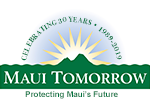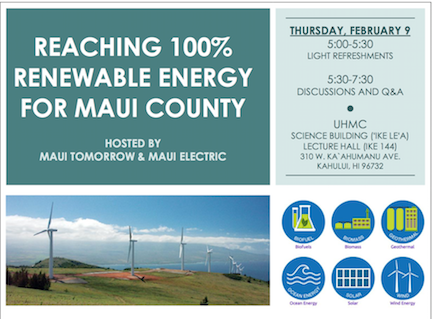An editorial in the Star-Advertiser advocates more citizen participation in the Big Wind planning – especially since HECO is trying to charge ratepayers for $4 million in planning costs. (italics are comments on or additions to the Star-Advertiser editorial)
Mayor Arakawa points out that “no one can tell us where the cable will run, its overall cost or how it would interconnect with the grids on the islands of Maui, Molokai and Lanai.… We need a clear, complete, accurate, detailed analysis for the cable system before we agree to finance it on the backs of the ratepayers.”
Robbie Alm of HECO said a connection with Maui island has not been decided yet. (One wonders what that $4 million — actually $7 million counting the Federal grant– has been spent on!)
The U.S. Department of Energy has begun preparing its environmental impact statement on the project and the state will begin work on its EIS after the federal document is completed, Alm said. At that point, possibly this fall, the public will be allowed full access and participation in the process, he said, In addition, he said, the project will need 70 state permits, each of which will be subject to public hearings before being granted.
Question: Will details such as what sites are proposed to connect Maui to the grid be in the EIS?
Indeed, the present process consists of “technical studies to determine the possibility of adding large amounts of wind and solar energy to the Oahu grid,” HECO spokesman Peter Rosegg told the Star-Advertiser’s Alan Yonan Jr. The results of those studies “do not mean the Interisland Wind project will be done, only that it is possible,” he added.
The attempt by Honolulu-based Life of the Land to intervene so it could gain access to all the information about the project has been rejected by the PUC. The environmental organization’s executive director, Henry Curtis, said his attempt to obtain public documents from the state has been resisted. Curtis said the Department of Business, Economic Development and Tourism said it would cost Life of the Land $15,000 for photocopies of all its Big Wind material, and the PUC would charge $8,000 for copies of its documents.
PUC Chairwoman Hermina Morita says it complied with the law on Curtis’s request, which asked for an overabundance of information (see today’s Letters to the Editor), and that anyone can view the commission’s website.
But while the PUC is not bound by the information disclosure standards of other state agencies, it needs to be acutely aware that public accessibility and understanding is crucial to what would be the priciest, most controversial public utility project in the state’s history, even at this pre-EIS stage. The movers and shakers need to ensure comprehensive openness as the state environmental impact statement process unfolds with an abundance of hearings and thorough public scrutiny.


